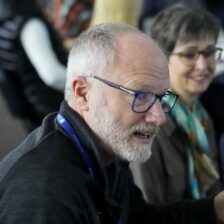 Back in 2006, our church was looking at developing a formal leadership training program to see if we could enhance our capabilities in more effectively guiding others. As part of the pre-work, I was asked to interview a number of leaders (both paid and volunteer) to understand what they did to improve their leadership capabilities and why they believed they took on leadership roles in the first place.
Back in 2006, our church was looking at developing a formal leadership training program to see if we could enhance our capabilities in more effectively guiding others. As part of the pre-work, I was asked to interview a number of leaders (both paid and volunteer) to understand what they did to improve their leadership capabilities and why they believed they took on leadership roles in the first place.
The conversations were engaging and I heard many thought-provoking ideas. Interestingly, as I gathered my information, there was one overriding theme the came through from almost all of the leaders. Each one of them highlighted the fact that early in their lives someone came alongside them and mentored them, both in their faith journey as well as issues of life in general. Typically it was meeting with them on a weekly basis, often times for up to two years, and many of these leaders were still in contact with those mentors. As someone who has been doing this for many years, I was excited by this finding.
When I heard this, I asked a follow up question: since this life-on-life connecting had had such a big impact on their lives, I asked them who they were meeting with so that this could be passed on to the next generation. It only made sense that if this was instrumental in their lives then they would want to do the same for someone else. Every single one of them replied “no one.” Did you hear that? “No one.”
The very thing that had laid the foundation for their lives and set them on a course of leadership, the one thing that everyone had recognized as being instrumental in their own development they were not doing themselves.
I had to ask myself – why did we need to develop any leadership development program? What would its purpose really be? The leaders that we had already knew what they needed to do to develop leaders. Each of them had been given a gift from someone else who had come alongside them to develop them. All they needed to do was to do the same thing with some else and the leadership development circle would continue.
In the local church discipleship and helping people mature in their relationship with God, church leaders continue to look for methods and programs and formats that they believe will help those in their congregations to grow and mature. They change things up on a regular basis trusting that one of these years they will find the magic bullet. And yet, people continue to live stagnant lives when it comes to faith in God.
Can we admit that we already have the methods and means with which to help others grow and develop? That we don’t need the next great DVD series from the next up and coming communicator from the “fastest growing church” in North America. That we don’t need to find another set of curriculum to use. That we don’t need to attend yet another conference on the latest “relevant” religious topic.
Think about your own development and growth? What was it for you? Was it fancy and earth shattering? Did it involve massive gatherings of people in convention centres? This may have played a small part, and yet, what was it really?
Personally, I can agree with the leaders that I interviewed. A guy came alongside me in second year university and met with met on a consistent basis. We memorized scripture, we prayed, we studied. He shared his life with me and helped me figure out mine. We are still friends to this day.
Perhaps there is nothing exciting about this, and yet, when I look back on my life, it set the course for the last 25 years, and that is very exciting.
Let’s admit that we know what we need to do to make disciples. It’s not complicated. So let’s get on with it and do what we know we need to do.
